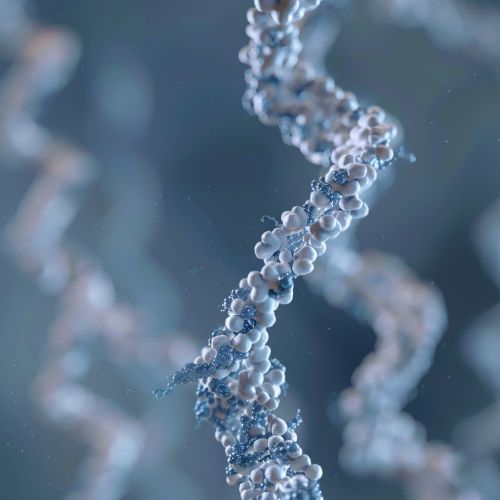Collagen
Introduction
Collagen is the most abundant protein in the human body, accounting for about a third of the body's protein content. It's one of the major building blocks of bones, skin, muscles, tendons, and ligaments. Collagen is also found in many other body parts, including blood vessels, corneas, and teeth.

Structure and Synthesis
Collagen is a complex protein with a unique structure. It is composed of three polypeptide chains arranged in a triple helix, with each chain being a coil itself. This unique structure gives collagen its strength and durability. The synthesis of collagen is a complex process that involves several stages. It begins in the ribosome, where the protein synthesis occurs. The next step is the hydroxylation of the amino acids lysine and proline, which occurs in the endoplasmic reticulum. This process requires vitamin C as a cofactor.
Types of Collagen
There are at least 16 types of collagen, but the vast majority of the collagen in the body is type I, II, III, IV, and V.
- Type I: This type accounts for 90% of the body's collagen and is made of densely packed fibers. It provides structure to skin, bones, tendons, fibrous cartilage, connective tissue, and teeth.
- Type II: This type is found in elastic cartilage, which cushions joints.
- Type III: This type supports the structure of muscles, organs, and arteries.
- Type IV: This type helps with filtration and is found in layers of the skin.
- Type V: This type is found in the surfaces of cells, hair, and placenta.
Functions
Collagen has many important functions, including providing your skin with structure and strengthening your bones. In recent years, it has gained popularity as a nutritional supplement and ingredient in body lotions and shampoos.
- Skin Health: Collagen plays a role in strengthening skin, and may benefit elasticity and hydration. As you age, your body produces less collagen, leading to dry skin and the formation of wrinkles.
- Joint and Bone Health: Collagen helps maintain the integrity of your cartilage, which is the rubber-like tissue that protects your joints. With the aging process, the amount of collagen decreases, leading to development of degenerative joint disorders such as osteoarthritis.
- Heart Health: Collagen provides structure to your arteries, which are the blood vessels that carry blood from your heart to the rest of your body. Without enough collagen, arteries may become weak and fragile.
Collagen Deficiency and Diseases
A lack of collagen can lead to various health problems. For example, a severe collagen deficiency can result in scurvy, a disease characterized by anemia, bleeding gums, and skin hemorrhages. Other diseases related to collagen include osteogenesis imperfecta, often referred to as brittle bone disease, and Ehlers-Danlos syndrome, a group of inherited disorders that affect the connective tissues.
Collagen Supplements
In recent years, collagen supplements have become popular. Most are hydrolyzed, which means the collagen has been broken down, making it easier for the body to absorb. There's some evidence that collagen supplements help with arthritis pain and promote skin health, but more research is needed to confirm these effects.
See Also
- Protein - Osteoarthritis - Scurvy - Osteogenesis Imperfecta - Ehlers-Danlos Syndrome
